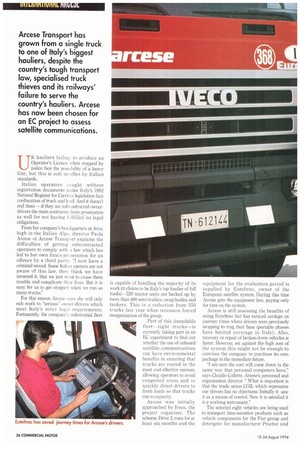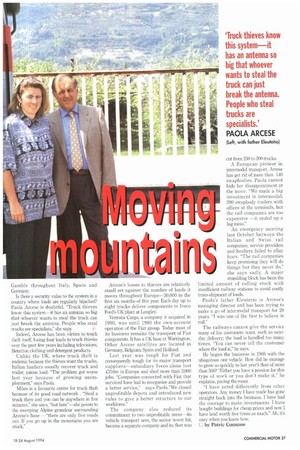Arcese Transport has grown from a single truck to one
Page 38

Page 39

If you've noticed an error in this article please click here to report it so we can fix it.
of Italy's biggest hauliers, despite the country's tough transport law, specialised truck thieves and its railways' failure to serve the country's hauliers. Arcese has now been chosen for an EC project to assess satellite communications.
UK hauliers failing to produce an Operator's Licence when stopped by police face the possibility of a heavy fine, but this is soft noodles by Italian standards.
Italian operators caught without registration documents under Italy's 1992 National Register for Carriers legislation face confiscation of truck and load. And it doesn't end there —if they are subcontracted ownerdrivers the main contractor faces prosecution as well for not having filfilled its legal obligations.
From her company's headquarters at Arco, high in the Italian Alps. director Paola Arcese of Arcese Transport explains the difficulties of getting subcontracted operators to comply with :, law which has led to her own firm's pn.secution for an offence by a third party. "I now have a criminal record. Some Italian carriers are not aware of this law, they think we have invented it, that we just want to cause them trouble and complicate their lives. But it is easy for us to get stopped when we run so many trucks."
For this reason Arcese says she will only sub work to "serious" owner-drivers which meet Italy's strict legal requirements. Fortunately, the company's substantial fleet is capable of handling the majority of its work (it claims to be Italy's top haulier of full loads)-320 tractor units are backed up by more than 400 semi-trailers, swap-bodies and tankers. This is a reduction from 550 trucks last year when recession forced reorganisation of the group, Part of this formidable fleet—eight trucks—is currently taking part in an EC experiment to find out whether the use of onboard satellite communications can have environmental benefits in ensuring that trucks are routed in the most cost-effective manner, allowing operators to avoid congested areas and to quickly direct drivers to fresh loads so that trucks run to capacity Arcese was initially approached by Iveco, the project organiser. The scheme, Drive 2, runs for at least six months and the equipment for the evaluation period is supplied by Euteltrac, owner of the European satellite system. During this time Arcese gets the equipment free, paying only for time on the system.
Arcese is still assessing the benefits of using Euteltrac but has noticed savings on journey times where drivers were previously stopping to ring their base (portable phones have limited coverage in Italy). Also, recovery or repair of broken-down vehicles is faster. However, set against the high cost of the system this might not be enough to convince the company to purchase its own package in the immediate future.
"I am sure the cost will come down in the same way that personal computers have," says Claudio Collette, Arcese's personnel and organisation director. "What is important is that the trade union CGIL which represents our drivers has no objections. Initially it saw it as a means of control. Now it is satisfied it is a working instrument."
The selected eight vehicles are being used to transport time-sensitive products such as vehicle components for the Fiat group and detergent for manufacturer Proctor and Gamble throughout Italy, Spain and Germany.
Is there a security value to the system in a country where loads are regularly hijacked? Paola Arcese is doubtful. "Truck thieves know this system—it has an antenna so big that whoever wants to steal the truck can just break the antenna. People who steal trucks are specialists," she says.
Indeed, Arcese has.been victim to truck theft itself, losing four loads tO truck thieVes over the past few years including televisions, Benetton clothing and detergent products.
Unlike the UK, where truck theft is endemic because the thieves want the trucks, Italian hauliers usually recover truck and trailer, minus load. "The problem got worse last year because of growing unemployment," says Paola.
Milan is a favourite centre for truck theft because of its good road network . "Steal a truck there and you can be anywhere in five minutes." she says, "but here"—she points to the sweeping Alpine grandeur surrounding Arcese's base – "there are only five roads out. If you go up in the mountains you are stuck." Arcese's losses to thieves are relatively small set against the number of loads it moves throughout Europe-30,000 in the first six months of this year. Each day up to eight trucks deliver components to lveco Ford's UK plant at Langley Ventana Cargo, a company it acquired in 1990, was until 1980 the own-account operation of the Fiat group. Today most of its business remains the transport: of Fiat components. It has a UK base at Warrington.. Other Arcese satellites arc located in Germany, Belgium, Spain and I lolland.
Last year was tough for Fiat and consequently tough for its major transport suppliers—subsidiary Iveco alone lost £216m in Europe and shed more than 3,000 jobs. "Companies connected with Fiat that survived have had to reorganise and provide a better service," says Paola."We closed unprofitable depots and introduced new rules to give a better structure to our workforce."
The company also reduced its commitment to two unprofitable areas—its vehicle transport arm, the sector worst hit, became a separate company and its fleet was cut from 250 to 200 trucks.
A European pioneer in intermodal transport, Arcese has got rid of more than 140 swapbodies. Paola cannot hide her disappointment at the move. "We made a big investment in intermodal: 290 swapbody trailers with offices at the terminals, but the rail companies are too expensive —it ended up a big mess."
An emergency meeting last October between the Italian and Swiss rail companies, service providers and hauliers failed to allay fears. "The rail companies keep promising they will do things but they never do," she says sadly. A major stumbling block has been the limited amount of rolling stock with insufficient railway stations to avoid costly trans-shipment of loads.
Paola's father Eleuterio is Arcese's managing director and has been trying to make a go of intermodal transport for 20 years. "I was one of the first to believe in rail."
The railways cannot give the service many of his customers want, such as nextday delivery the load is handled too many times. "Yon can never tell the customer where.the load is," he says.
He began the business in 1966 with the ubiquitous one vehicle. How did he manage to grow so quickly to last year fleet of more than 500? "Either you have a passion for this type of work or you don't make it," he explains, pacing the room.
1. have acted differently from other operators. Any money I have made has gone straight back into the business. I have had the courage to make investments. I have bought buildings for cheap prices and now I have land worth five times as much." Ah, it's easy when you know how.
I.: by Patric Ctumane
























































































